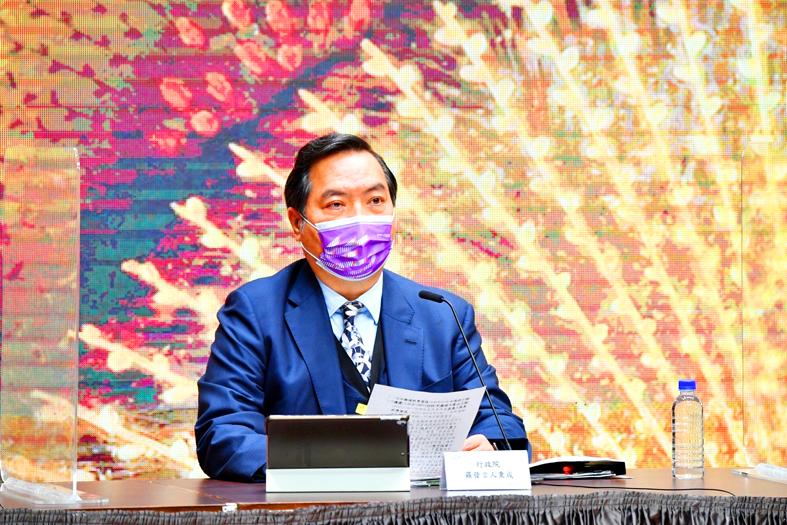The Cabinet yesterday extended its “Invest in Taiwan” initiative for three years, adding more funding and requirements to meet the government’s 2050 net-zero carbon emissions goals.
The extension of the repatriation program came amid persistent demand from Taiwanese businesses and an anticipated wave of reshoring due to changes in China’s business environment, Executive Yuan spokesman Lo Ping-cheng (羅秉成) told a news conference in Taipei after a weekly Cabinet meeting.
The initiative, which began in July 2019 and is due to expire at the end of next week, provides favorable loan terms, and assistance in accessing land, utilities and talent to firms seeking to move production to Taiwan or expand their local operations.

Photo courtesy of the Executive Yuan
As of Friday last week, the government had approved 1,109 applications from Taiwanese businesses to invest a combined NT$1.55 trillion (US$55.78 billion) under the initiative, the InvesTaiwan Service Center said last week, adding that the investment pledges are estimated to create 123,425 jobs.
With the initiative extended through 2024, the government plans to provide an additional NT$430 billion in financing for participating firms, which is expected to attract NT$900 billion in investment and create 40,000 jobs, Lo said.
As there is still NT$60 billion in unused financing for the current program, the available loans for participating firms would be NT$490 billion, Deputy Minister of Economic Affairs Tseng Wen-sheng (曾文生) said.
The government would review the size of financing on a rolling basis and adjust the loan amount as needed, Tseng said.
The Ministry of Economic Affairs said that the initiative would still provide firms with preferential loans, but it would make minor adjustments to interest-rate subsidies and the duration of the benefits for different programs.
As for the net-zero carbon emissions requirement, Tseng said that participating firms would be reviewed based on their plans to use green energy, or energy-saving or low-carbon emissions equipment; implement heat recovery or circulation; construct green buildings; and enact projects that contribute to the government’s net-zero carbon emissions goal.
InvesTaiwan Service Center chief executive Emile Chang (張銘斌) said that the government would set separate requirements for large, small and medium-sized enterprises to implement energy saving and carbon reduction programs, rather than a uniform standard.
As a result, applicants for the initiative would be reviewed on a case-by-case basis on this front, Chang said.
The announcement came after Chinese authorities last month hit Taiwanese conglomerate Far Eastern Group (遠東集團) with hefty fines for allegedly contravening regulations on environmental protection, land use, employee health, safety, taxes and product quality, while state-backed Chinese media reported that the fines were connected to Far Eastern’s role as one of the biggest donors to President Tsai Ing-wen’s (蔡英文) Democratic Progressive Party.
Many Taiwanese businesses have already exited China amid US-China trade tensions, but the Far Eastern incident, coupled with China’s stricter environmental protection and carbon reduction rules, have prompted more to participate in the government’s initiative, Minister of Economic Affairs Wang Mei-hua (王美花) said late last month.

AIR SUPPORT: The Ministry of National Defense thanked the US for the delivery, adding that it was an indicator of the White House’s commitment to the Taiwan Relations Act Deputy Minister of National Defense Po Horng-huei (柏鴻輝) and Representative to the US Alexander Yui on Friday attended a delivery ceremony for the first of Taiwan’s long-awaited 66 F-16C/D Block 70 jets at a Lockheed Martin Corp factory in Greenville, South Carolina. “We are so proud to be the global home of the F-16 and to support Taiwan’s air defense capabilities,” US Representative William Timmons wrote on X, alongside a photograph of Taiwanese and US officials at the event. The F-16C/D Block 70 jets Taiwan ordered have the same capabilities as aircraft that had been upgraded to F-16Vs. The batch of Lockheed Martin

US President Donald Trump yesterday announced sweeping "reciprocal tariffs" on US trading partners, including a 32 percent tax on goods from Taiwan that is set to take effect on Wednesday. At a Rose Garden event, Trump declared a 10 percent baseline tax on imports from all countries, with the White House saying it would take effect on Saturday. Countries with larger trade surpluses with the US would face higher duties beginning on Wednesday, including Taiwan (32 percent), China (34 percent), Japan (24 percent), South Korea (25 percent), Vietnam (46 percent) and Thailand (36 percent). Canada and Mexico, the two largest US trading

GRIDLOCK: The National Fire Agency’s Special Search and Rescue team is on standby to travel to the countries to help out with the rescue effort A powerful earthquake rocked Myanmar and neighboring Thailand yesterday, killing at least three people in Bangkok and burying dozens when a high-rise building under construction collapsed. Footage shared on social media from Myanmar’s second-largest city showed widespread destruction, raising fears that many were trapped under the rubble or killed. The magnitude 7.7 earthquake, with an epicenter near Mandalay in Myanmar, struck at midday and was followed by a strong magnitude 6.4 aftershock. The extent of death, injury and destruction — especially in Myanmar, which is embroiled in a civil war and where information is tightly controlled at the best of times —

China's military today said it began joint army, navy and rocket force exercises around Taiwan to "serve as a stern warning and powerful deterrent against Taiwanese independence," calling President William Lai (賴清德) a "parasite." The exercises come after Lai called Beijing a "foreign hostile force" last month. More than 10 Chinese military ships approached close to Taiwan's 24 nautical mile (44.4km) contiguous zone this morning and Taiwan sent its own warships to respond, two senior Taiwanese officials said. Taiwan has not yet detected any live fire by the Chinese military so far, one of the officials said. The drills took place after US Secretary